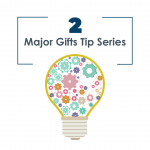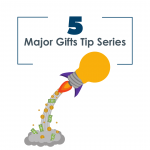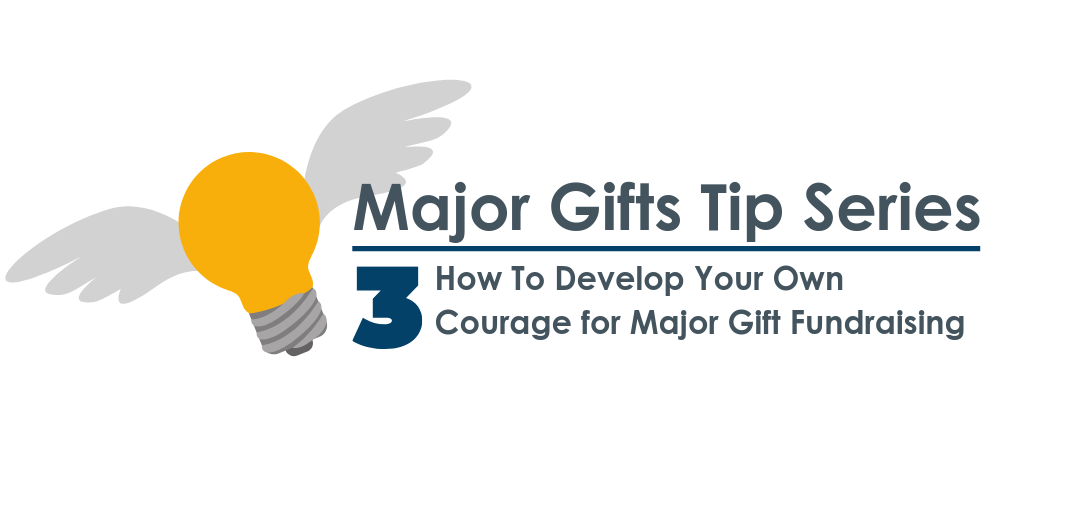
 Major Gifts Series #5: How to Get Appointments With Major Donors This Year
Major Gifts Series #5: How to Get Appointments With Major Donors This Year I hope you are enjoying this email series I’m sending to help you succeed in major gift fundraising. It’s a lot of food for thought, so take some time to digest it.
I hope you are enjoying this email series I’m sending to help you succeed in major gift fundraising. It’s a lot of food for thought, so take some time to digest it.
Focus on major gifts, and you’ll get the largest return on your investment of time and energy.
That’s where the really big funding is! You can’t afford NOT to invest in major gifts. :)
Today we are talking about courage.
Specifically, the type of courage you need to get out of your office and go make friends with major donors.
Yes, this can be frightening.
I hear lots of people saying that they are simply nervous. I totally agree! But you CAN gain complete confidence when dealing with high net worth donors.
First, let me share my own story:
When I first started out in fundraising, I was intimidated. I used to say to myself, “Why would these major donors ever want to spend time with me? I am a nobody, and they are such Very Important People.”
It used to feel like the donors were high up on a hill. Far, far away from me. The distance was so great. The gap between us was so wide. I was so young. They were older and so prominent.
To make matters worse, I had this huge fundraising goal hanging over my head!
Have you ever felt like this?
Does this discomfort tend to keep you and your colleagues stuck in the office? Is this the secret reason you hide behind your email rather than getting out for donor visits?
Listen, I completely understand. You are perfectly normal. You just need some support.
This is why we created Major Gift Coaching. To help smart and capable fundraising teams develop their confidence, and learn the skills for successful major gifts.
Coaching will guide your team to build a systematic, major gifts program complete with monthly goals.
To help you, here are my favorite tips to develop confidence when approaching major donors.
So let’s start now by developing your confidence for major gift fundraising. Here’s what you need to master in order to be successful at major donor relationships.
You want to come across well in your email or phone call when you request the meeting. Your first communication makes a huge first impression. Your request for a meeting needs to:
Don’t say, “I’d like to update you on what our nonprofit is doing.”
That will probably bring you a “no, we don’t need to meet” from your donor.
Instead you want to say, “I’d like to update you on a new project we are doing, and would like your take on it.”
Or say, “I’d like to get your input on xxx or yyy issue.”
Above all, let your donor know that you really do value her opinion.
And, let her know that she is the one who gets to do the talking in the meeting – not you. :)
Over and over, fundraisers tell me that when they are properly prepared, they are far more comfortable. Being thoroughly prepared will give you confidence.
You want to:
Most importantly, you want to know what they are most interested in.
This is a fine line, but you can quickly develop an instinct for how to walk it. You are cordial, and you talk about the donor’s interests, right?
Some donors will want to spend 25 minutes of a 30 minute appointment talking about the latest sports event or their last vacation. And you are sweating it out – wondering how to shift the conversation to business. (Have you been here before? I sure have!)
With practice you’ll develop your skill to gently change the subject. If you stay too social, your donor will forget what your real job is.
You must, must, always discuss fundraising issues with your donor. Such as:
This is how you begin to build lasting, productive and enjoyable relationships with your donors.
And remember our Major Gift Coaching closes out on February 15th.
Let me know if you are interested! https://gailperrygroup.com/major-gifts-coaching/

 Major Gifts Series #5: How to Get Appointments With Major Donors This Year
Major Gifts Series #5: How to Get Appointments With Major Donors This Year